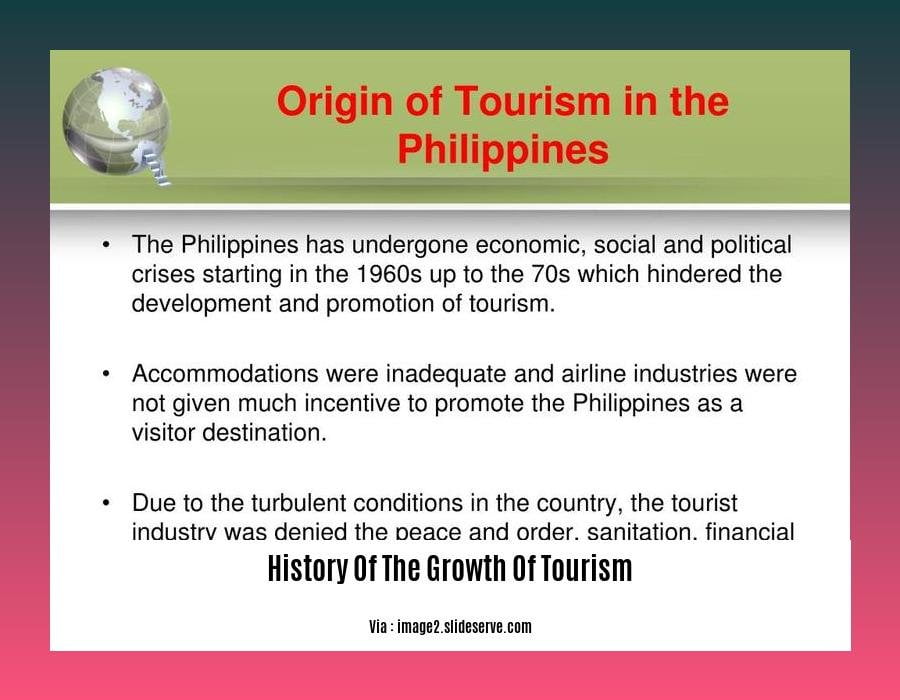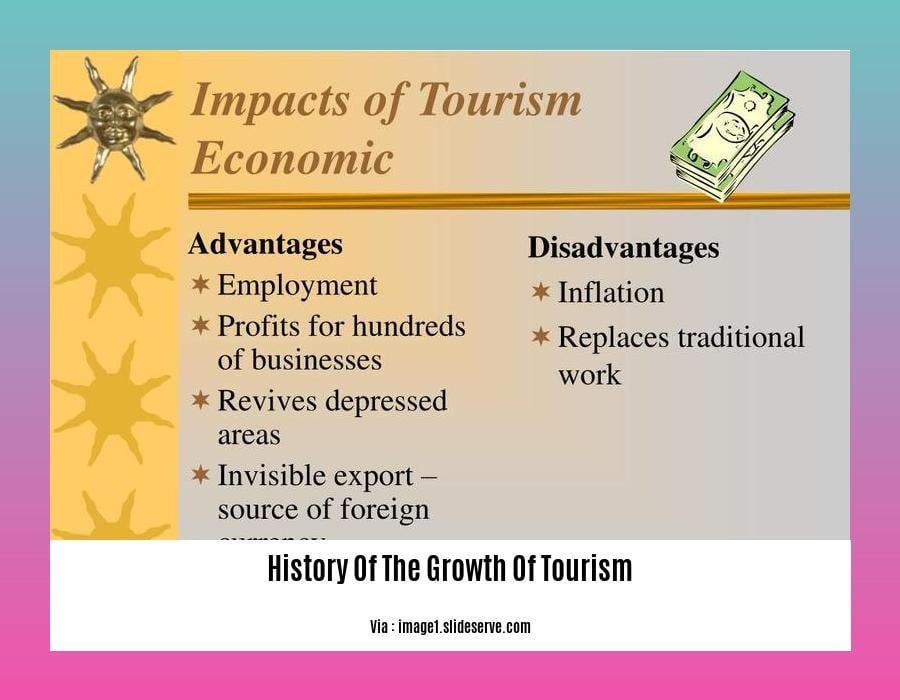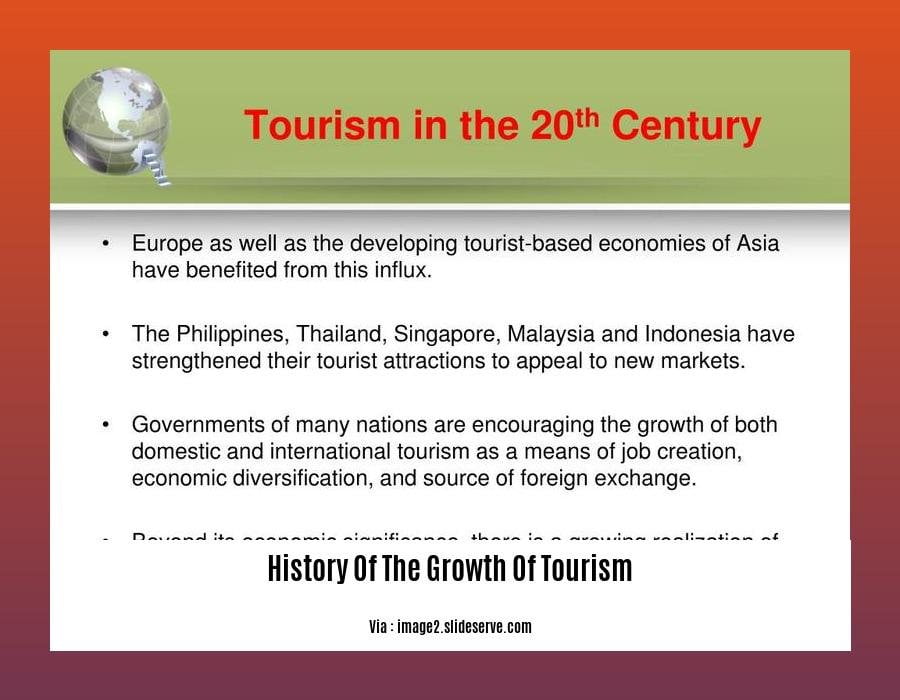Embark on a historical odyssey with “- The History of the Growth of Tourism: A Journey from Elite Pastime to Global Phenomenon.” Tracing the evolution of tourism from its aristocratic origins to its present-day ubiquity, this article delves into the fascinating interplay of historical forces, socio-cultural influences, and technological advancements that have shaped one of the world’s most dynamic industries.
Key Takeaways:
- Tourism’s origins trace back to the Roman Empire.
- Pilgrimages fueled travel during the medieval period.
- Renaissance exploration inspired travel for knowledge and leisure.
- Modern tourism emerged with transportation and communication advancements.
- Post-WWII travel became more accessible with airlines and travel agencies.
- Increased leisure time, disposable income, and technology contributed to tourism growth.
- Tourism benefits economies, fosters cultural exchange, and supports environmental preservation.
History of the Growth of Tourism


Ancient Roots
Tourism’s origins date back to ancient times. In the Roman Empire, citizens embarked on journeys for pleasure, visiting far-off provinces and admiring architectural marvels.
Pilgrimages and Exploration
During the Middle Ages, religious pilgrimages flourished. Devout individuals traveled vast distances to visit holy sites, fostering cultural exchange and inspiring tales of adventure. The Renaissance witnessed an explosion of exploration and discovery, igniting interest in distant lands and attracting travelers seeking knowledge and enlightenment.
Industrial Revolution and Mass Tourism
The Industrial Revolution ushered in a new era of tourism. Technological advancements in transportation and communication facilitated mass travel, bringing the world closer together. The rise of leisure time and disposable income fueled a surge in tourism as people sought relaxation and rejuvenation.
Post-WWII Boom
Following World War II, commercial airlines and global travel agencies soared. International travel became more accessible, opening up new destinations to eager explorers. The tourism industry experienced a golden age, transforming economies and connecting people across borders.
Factors Driving Growth
Several factors have contributed to the phenomenal growth of tourism:
- Increased leisure time and disposable income
- Technological advancements in transportation and communication
- Improved infrastructure and services
Benefits of Tourism
Tourism has had a profound impact on the world:
- Economic Benefits: Tourism is a major economic driver, creating jobs, generating tax revenue, and supporting local businesses.
- Cultural Exchange: Tourism fosters cultural understanding and promotes dialogue between people from diverse backgrounds.
- Environmental Conservation: Ecotourism promotes responsible travel and helps protect natural habitats.
The Future of Tourism
As the world evolves, tourism will continue to adapt and innovate. Sustainable practices, digital technology, and personalized experiences will shape the future of travel, creating opportunities for growth while preserving the planet and its cultural heritage.
Learn in detail about the era when the tourism industry was first introduced and start growing rapidly, read more about The Growth Of to know more about how it started.
History Of tourism describes the origin of this sector over the years and the various stages of its development in detail, so don’t miss out and click to read more about it.
Don’t miss out on the opportunity to know why tourism is the main and most important industry in that region, know the full details when you click on Why Is Tourism The Major Industry In The Loess Bluffs Region.
Tourism is such an immense industry with a variety of sub-sectors, and if you are interested in knowing more about the different sectors within the tourism industry, click on The Growth Of Tourism Industry to discover them.
Growth[edit]
Since the early days of tourism, there has been a steady increase in its popularity and accessibility. This growth can be attributed to several factors, including increased leisure time, disposable income, improved transportation, and technological advancements.
- Increased leisure time: As working hours decreased and paid vacations became more common, people had more time to travel and explore new places.
- Disposable income: Rising incomes gave people more financial resources to spend on travel.
- Improved transportation: Advancements in transportation technology, such as the development of railroads, steamships, and airplanes, made travel faster, easier, and more affordable.
- Technological advancements: The development of the internet and other communication technologies made it easier for people to plan and book their trips, and also to share their travel experiences with others, inspiring more people to travel.
Growth of tourism has had a significant impact on the global economy. It has created jobs in the tourism industry, including in transportation, hospitality, and retail. It has also generated revenue for governments through taxes and fees.
Tourism has also had a major impact on cultures around the world. It has led to increased cultural exchange and understanding, and has helped to preserve cultural heritage. However, it can also have negative impacts on destinations, including environmental degradation and social disruption. As a result, it is important for tourism to be managed in a sustainable way that benefits both tourists and local communities.
Key Takeaways:
- Tourism has grown significantly over the centuries due to factors such as increased leisure time, disposable income, and technological advancements.
- Tourism has a major economic impact, creating jobs and generating revenue.
- Tourism can have both positive and negative impacts on destinations, including cultural exchange and environmental degradation.
- It is important to manage tourism sustainably to minimize negative impacts and maximize benefits.
Citations:
– World Tourism Organization
– The Geography of Tourism
Etymology of Tourism
想知道“旅游”一词的由来吗?让我们踏上时光之旅,追溯它的词源吧!
词源演变之旅
回到古希腊
“旅游”一词的根源可以追溯到古希腊单词,这个单词指的是用于描述圆形的工具。这表明旅游在本质上涉及环形旅程,游客最终会回到他们的出发点。
进入牛津
“旅游”一词首次出现在牛津英语词典中,时间是 1811 年。从此以后,它就一直用来描述人们寻求娱乐、知识或其他目的而进行的旅行。
Key Takeaways:
- “旅游”一词起源于古希腊语,意为“描述圆形的工具”。
- 它出现在牛津英语词典中,时间是 1811 年。
- 旅游涉及环形旅程,游客最终会回到他们的出发点。
Relevant URL Sources:
- An Etymology of “Tourism” – ScienceDirect
- The Origin and Meaning of Tourism: Etymological Study – Academia.edu
FAQs
Q1: What were the earliest forms of tourism?
A1: The earliest known forms of tourism date back to the Roman Empire, where people travelled for religious, cultural, and educational purposes.
Q2: How did the Industrial Revolution impact tourism?
A2: The Industrial Revolution led to advancements in transportation and communication, making travel more accessible and affordable, and thus expanding the concept of “tourism.”
Q3: What is the significance of the term “Grand Tour” in tourism history?
A3: The Grand Tour was an extensive journey undertaken by young, affluent Europeans during the 17th and 18th centuries, primarily to explore the cultural and historical landmarks of Europe. It had a profound impact on the development of tourism as an organized activity.
Q4: How did the ety Internationale of the word “tourism” influence its early perception?
A4: The word “tourism” is derived from the Greek word for “circle,” suggesting that tourism involves a journey where travellers return to their starting point. This early meaning shaped the idea of tourism as a temporary and circular activity.
Q5: What are some of the factors that contributed to the growth of mass tourism in the 20th century?
A5: The growth of mass tourism in the 20th century was fuelled by factors such as increased disposable income, paid holidays, and the development of affordable transportation like commercial aviation and package tours.
- Unlock Water’s Symbolism: A Cross-Cultural Exploration - April 20, 2025
- Identify Black and White Snakes: Venomous or Harmless? - April 20, 2025
- Unlocking Potential: Origins High School’s NYC Story - April 20, 2025















